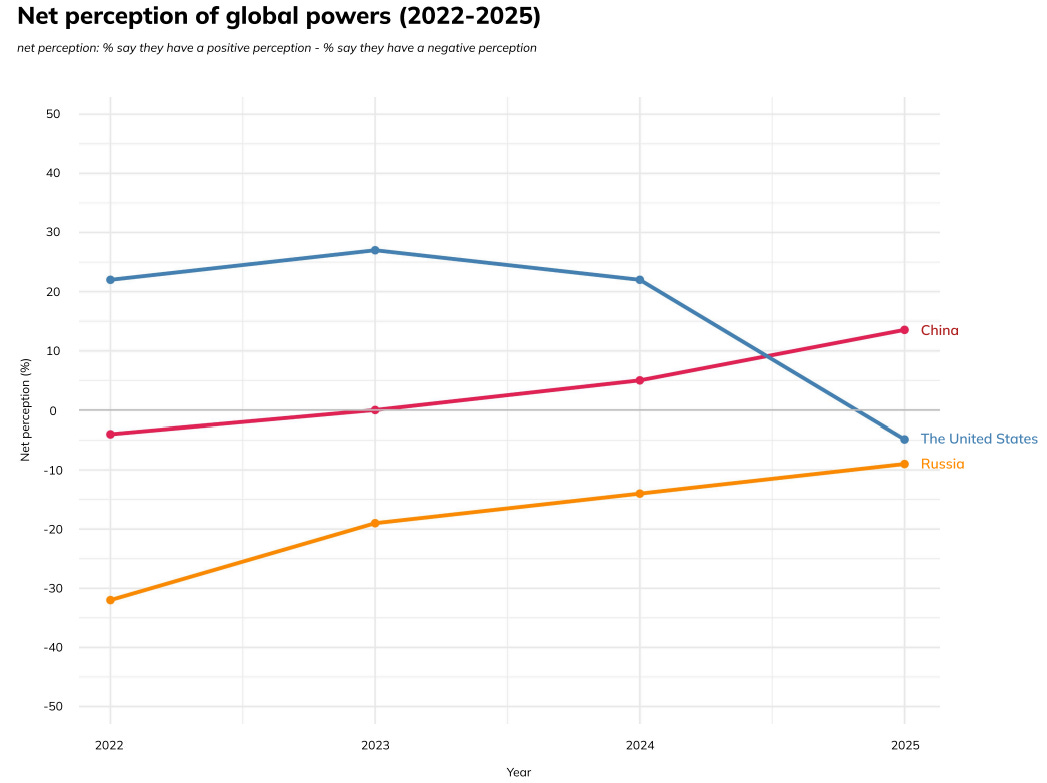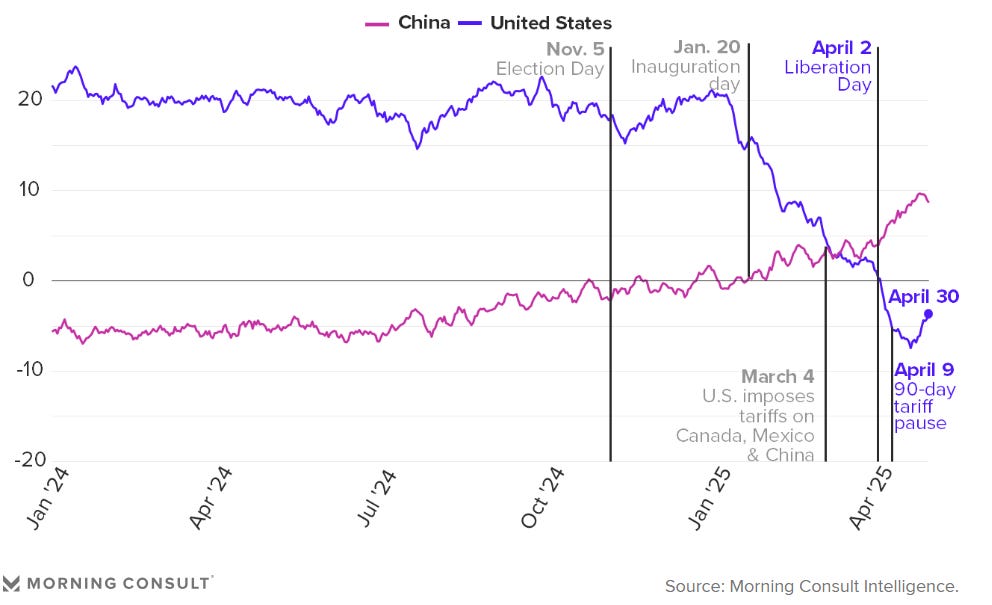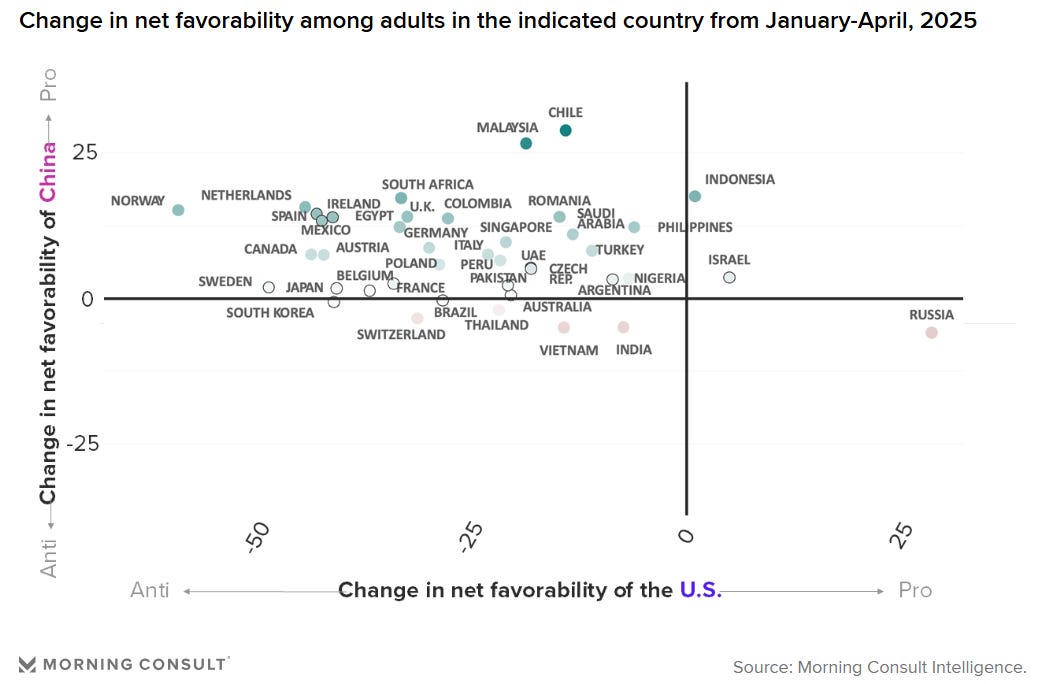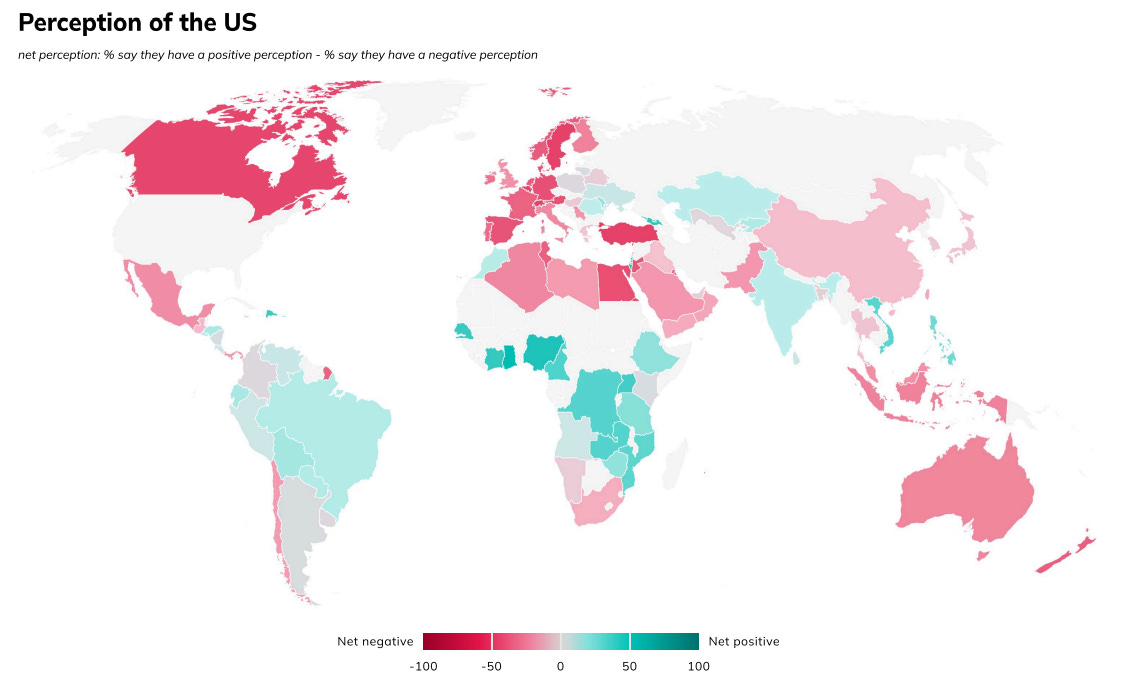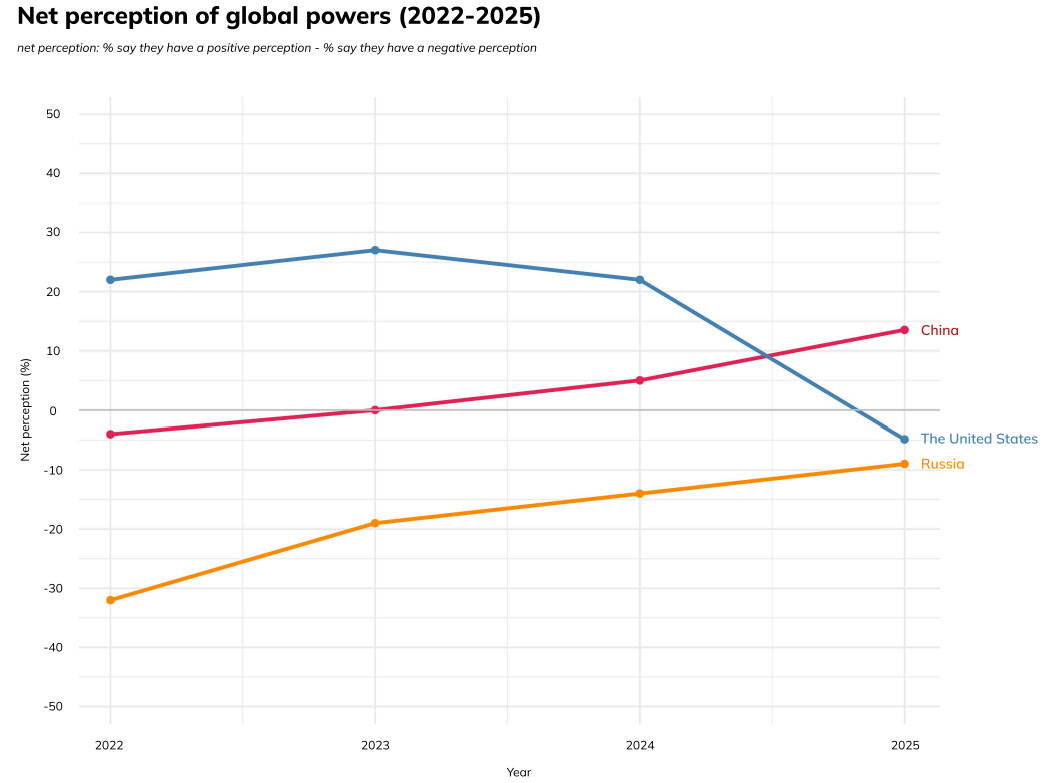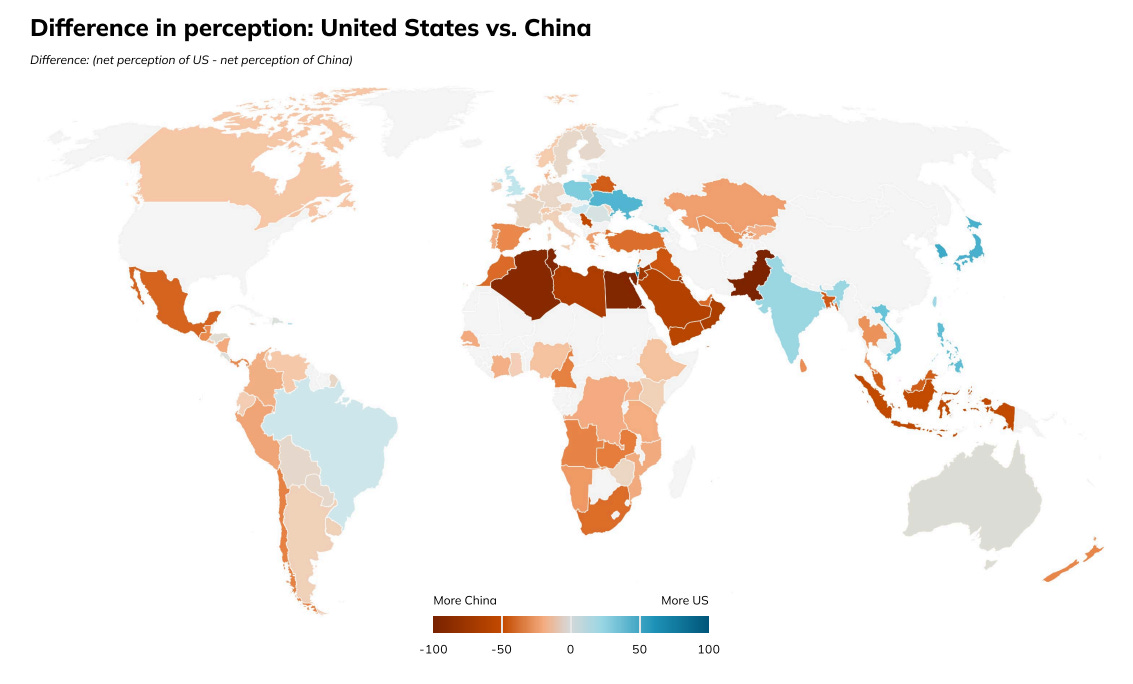What has the world thought of the Trump administration?
In geopolitics as in high school, being this unpopular is bad
Sometimes public opinion is mysterious, driven by a cocktail of attachments, resentments, and irrationalities that even the most expert analysts cannot decipher. Other times, starting a global trade war, berating foreign leaders on live TV, and causing hundreds of thousands of deaths makes people not like you.
One could have easily predicted that the chaos and belligerence of the Trump administration would harm global views of the United States. But now, nearly five months into the Trump administration, we have solid data showing it. Since election day, net favorability of the US is down 20%, meaning that more people around the world now view the US negatively than positively.
It’s hard to make comparisons on global opinion of the US over long stretches of time. Different researchers asked different questions at different intervals, and many countries are not consistently covered, particularly in the Global South. (Also, if you get confused by any data I reference in this post, some of it is in the charts you see, while some comes from the underlying reports, which I link to.)
Still, there’s a good chance that the first five months of the Trump administration have resulted in an unprecedented drop in global opinion of the US. Historically, Democratic presidents have been viewed more favorably abroad than Republicans, and changes in control of the White House have generated big swings in some countries. But right now we’re seeing a shift in the global average to a degree that was previously reserved only for certain countries. If current trends continue, the US will be less popular than Russia and Hungary by the end of the year.
When it comes to people voting with their feet, it’s a pretty similar story. Tourism to the US is down, with the United States’ increasingly toxic image and stories of gratuitous abuse of tourists dissuading people from travelling to the US. Estimates suggest this will result in about $10 billion less spending from foreign visitors compared to last year.
But it’s not all bad. There is one country has substantially improved its view of the United States since Trump took office: Russia.
Who still likes the US?
The most pronounced fall in opinion of the US has been in Western countries. These countries generally experience the greatest swings in opinion of the US when the president changes, but the shifts have been even bigger this time. Favorable views of the US are down 40% since January in Norway, Spain, Canada, Netherlands, and Sweden. (In the chart below, the x-axis shows change in support for the US.) In the UK, the proportion of people who believe the US “mostly uses its influence for bad in the world” has gone up from 16% to 41% in a year.
It’s more of a mixed story in the Global South. I think there are a couple reasons for this: in some countries news penetration is lower, conservative cultural views can boost support for Republicans, and people interpret favorability polls in a variety of ways (people who don’t support US foreign policy still might think it would be a nice place to live). But I also think part of this is that the Global South’s interests are a low priority for both parties, and while bearing the brunt of coercive American policies might be new for Europe, it’s not an entirely new story for much of the Global South. Global opinion of the US also deteriorated over the course of Biden’s term, and there’s evidence suggesting US policy on Gaza contributed to that—and as seen below, views of the US are significantly lower in Muslim-majority parts of the Global South.
China is getting invited to the popular kids’ table
I don’t think comparisons with China’s favorability are the most important factor here (this isn’t zero-sum), but much of the recent polling on US favorability has been conducted through that lens, and the results are striking.
As this chart shows, global favorability of China has been on an upward trend for years. But now, not only has China reached net favorable status, China has come to be viewed more favorably than the US since the start of the Trump administration. On a personal level, Trump is less popular globally than Xi Jinping and Vladimir Putin.
There’s also an important nuance here when it comes to the Global South. As covered above, the Global South tends to see the US more favorably than the Global North right now. But the level of support for the US in the Global South still lags behind the Global South’s support for China, as shown below.
China’s relative favorability should prompt some reflection in the US foreign policy community, where the conventional wisdom is that China’s “debt trap diplomacy” and “low-quality infrastructure” means the US is a far better partner to Global South countries than China. Also, some countries have not so much chosen China as been pushed away by the US. American politicians have been criticizing South Africa as too friendly to China for years, but in fact, South Africans viewed the US and China equally favorably as recently as January. But by April, South Africans preferred China by a 51% margin.
Being unpopular is bad
The Trump administration response to all this would be that they represent American voters, not people abroad. The US used to be governed by a bunch of suckers and other countries liked taking advantage of us. Now that we’re standing up for our own interests, they don’t like it, and that’s not our problem.
Unsurprisingly, I don’t buy this. For one, the Trump administration certainly wouldn’t say that China is a softy that lets other countries take advantage of it, but somehow it’s more popular than the US right now.
In geopolitics as in high school, being unpopular is bad. We live in an interconnected world, and we need countries who are willing to work with us. We need access to resources that we don’t have domestically. We benefit from motivated people wanting to come to the US. We need countries to cooperate in controlling potential pandemics and containing security threats.
If you want to be able to eat bananas, have your parents taken care of well in old age, and not spend future years stuck inside your house during a pandemic, you want there to be other countries willing to work with the US. While US leverage might mean countries concede to US demands in the short term, countries are looking left and right to find alternatives to working with the US in the medium and long term.
Whenever the US exits its MAGA-era, we are going to have a toxic international reputation that needs to be rebuilt. Biden’s “America is back” approach, which treated Trump’s first term as a fluke and assumed the US could waltz back into its global leadership role, just won’t be credible now that the US elected him a second time. This time, the US is going have to earn back the trust of the world. Achieving this will require taking the rest of the world’s priorities much more seriously—perhaps more seriously than the US ever has before.
Other items
Thank you so much to everyone who subscribed and shared my Substack. It’s uncomfortable asking people to share, but it really is the best way to spread the word—the number of subscribers has doubled since my last post. Your help is sincerely appreciated.
On the theme of spreading the word about good Substacks, my friend Tre recently started a Substack where he’ll write about his very wide array of interests and expertise: racial justice, international affairs, technology, and more!
For insight into the devastating and deadly effects that the destruction of USAID has wrought (and why Marco Rubio is definitely lying when he says no one has died), these pieces are worth a read.
Freddy’s take
Freddy has decided his favorite thing in the world is lying in the bathtub.


